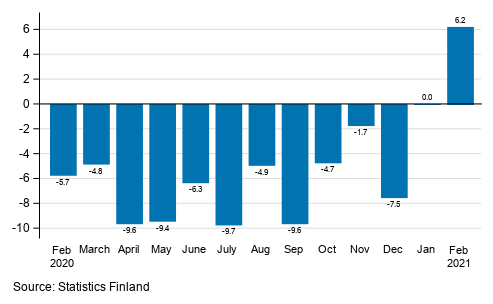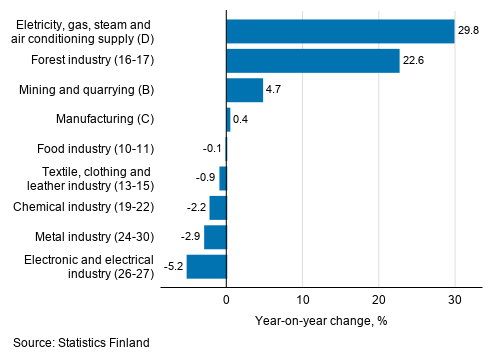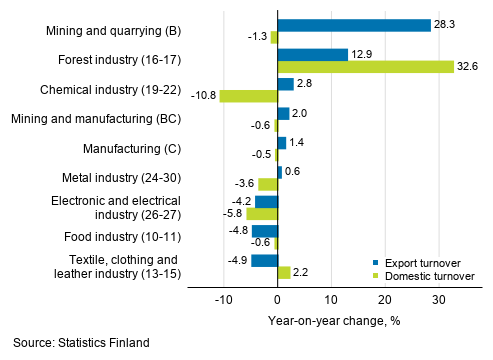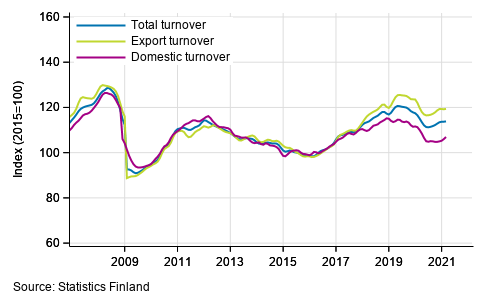Published: 15 April 2021
Turnover in industry grew by 6.2 per cent in February
According to Statistics Finland, working day adjusted turnover in industry (TOL BCD) grew in February by 6.2 per cent year-on-year. Among the main industries, turnover grew most in electricity, gas, steam and air conditioning supply, by 29.8 per cent from one year back. The growth in the industry was in part affected by risen prices of electricity. Turnover in the forest industry increased by 22.6 per cent year-on-year. The growth is explained by industrial actions in the field in February 2020, due to which the turnover of the forest industry was lower than normal. Seasonally adjusted turnover in industry (TOL BCD) grew by 2.6 per cent in February compared with January.
Annual change in working day adjusted turnover in manufacturing (BCD), % (TOL 2008)

In February, turnover decreased most in the electronic and electrical industry and was 5.2 per cent lower than one year earlier. Turnover in the metal industry fell by 2.9 per cent and in the chemical industry by 2.2 per cent. Turnover was lower than one year ago also in the textile, clothing and leather industry, and in the food industry.
Annual change in working day adjusted turnover in manufacturing by industry, February 2021, % (TOL 2008)

Export and domestic turnover in the forest industry grew in February
In February, growth in export turnover was strongest in the industry of mining and quarrying, up by 28.3 per cent from the previous year. Export turnover in the forest industry was 12.9 per cent higher than one year previously. Export turnover also grew in the chemical industry, by 2.8 per cent, and in the metal industry, by 0.6 per cent from one year back. Export turnover decreased most in the textile, clothing and leather industry, by 4.9 per cent, and in the food industry, by 4.8 per cent. In the electronic and electrical industry, export turnover was 4.2 per cent lower than one year ago.
Annual change in working day adjusted export turnover and domestic turnover in manufacturing by industry, February 2021, % (TOL 2008)

In February, growth in domestic turnover was strongest in the forest industry, up by 32.6 per cent from the previous year. Domestic turnover in the textile, clothing and leather industry grew by 2.2 per cent year-on-year. Domestic turnover decreased in the other main industries. Domestic turnover in the chemical industry decreased most, by 10.8 per cent from one year ago. Domestic turnover decreased in the electronic and electrical industry by 5.8 per cent, and in the metal industry by 3.6 per cent year-on-year. Domestic turnover in mining and quarrying was 1.3 per cent lower and that in the food industry 0.6 per cent lower than in the previous year.
Trend series of turnover, export turnover and domestic turnover in manufacturing (BC), 1/2007 to 2/2021, % (TOL 2008)

The index of turnover in industry describes enterprises whose main industry is manufacturing. The calculation of the indices is based on the Tax Administration’s self-assessed tax data which are supplemented with data obtained with Statistics Finland’s sales inquiry. The monthly turnovers of manufacturing enterprises can vary considerably, especially in the metal industries. The variation is mainly due to invoicing practices. The final invoice for major machinery deliveries and projects may be recorded in the sales of one month, even if the delivery had required the work of several months or years.
The factors caused by the variation in the number of weekdays are taken into account in adjustment for working days. This means taking into consideration the lengths of months, different weekdays and holidays. In addition, seasonal variation is eliminated from seasonally adjusted series, on account of which it makes sense to compare observations of two successive months as well.
The data for the latest month are preliminary and are released at a delay of around six weeks. The data may become significantly revised particularly on more detailed industry levels in coming months. Revisions to the data may be particularly significant on the more accurate industry levels of export turnover and domestic turnover.
Source: Index of turnover in industry 2021, February, Statistics Finland
Inquiries: Maija Sappinen 029 551 3348, Heli Suonio 029 551 2481, myynti.teollisuus@stat.fi
Head of Department in charge: Katri Kaaja
Publication in pdf-format (338.3 kB)
- Tables
-
Tables in databases
Pick the data you need into tables, view the data as graphs, or download the data for your use.
Appendix tables
- Figures
- Revisions in these statistics
-
- Revisions in these statistics (15.4.2021)
Updated 15.4.2021
Official Statistics of Finland (OSF):
Index of turnover in industry [e-publication].
ISSN=1798-596X. February 2021. Helsinki: Statistics Finland [referred: 1.7.2024].
Access method: http://www.stat.fi/til/tlv/2021/02/tlv_2021_02_2021-04-15_tie_001_en.html

